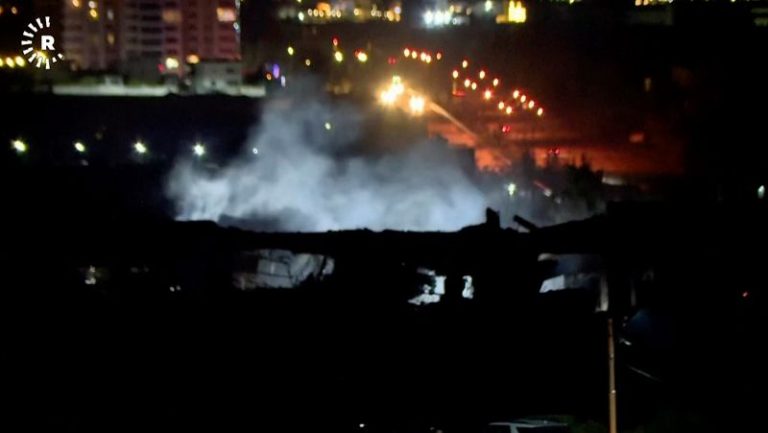Iran’s Revolutionary Guards on Monday launched ballistic missiles at what it said was a spy base for Israel’s intelligence agency Mossad in northern Iraq, and at “anti-Iran terror groups” in Syria, in the latest escalation of hostilities that further risks spiraling into a wider regional conflict.
The strikes were condemned by the United States as “reckless” and imprecise.
Iranian forces said the midnight missile strike in Iraq destroyed “one of the main espionage headquarters” of Israel in Erbil, capital of the semi-autonomous Kurdistan region, in response to what they said were Israeli attacks that killed Iranian Revolutionary Guard commanders and members of the Iranian resistance front.
“This headquarters has been the center for developing espionage operations and planning terrorist acts” in the region and Iran, the Islamic Revolutionary Guard Corps (IRGC) said in a statement Monday.
The IRGC also said it struck several locations in Erbil and claimed to target “sites of Iranian opposition groups.”
At least four civilians were killed and six others injured in the attack, according to a statement early Tuesday by the Security Council of the Kurdistan region.
“This blatant violation undermines the sovereignty of the Kurdistan Region and Iraq,” the Security Council said in its statement, which accused Iran of employing baseless pretexts to attack Erbil, a historically stable region that it said had never posed a threat to any party.
Also on Monday, the IRGC said it fired ballistic missiles at bases of “anti-Iran terror groups in occupied territories of Syria.”
It claimed the targets were involved in the recent dual bombings in the city of Kerman during a memorial for the slain Quds Force Commander Qasem Soleimani that left scores dead and wounded.
ISIS claimed responsibility for the deadly twin blasts near Soleimani’s burial site, in what was the deadliest attack in Iran since its 1979 revolution.
In its statement, the IRGC said it “identified and destroyed a number of key terror commanders and elements, especially Daesh (ISIS), in the occupied territories of Syria by firing a number of ballistic missiles.”
A US official said Monday initial indications of Iran’s missile attacks showed “this was a reckless and imprecise set of strikes.”
“We have seen the reports, and we tracked the missiles, which impacted in northern Iraq and northern Syria. No US personnel or facilities were targeted,” the official said.
“Iran is claiming this is in response to the terrorist attacks in Kerman, Iran, and Rask, Iran, with a focus on ISIS. We will continue to assess the situation.”
“No American personnel were injured,” they said.
Kurdistan region Prime Minister Masrour Barzani called on “our partners in the international community not to remain silent in the face of repeated attacks against the people of Kurdistan.”
“Earlier this evening, Erbil was once again attacked by Iran’s Revolutionary Guard Corps. Sadly, during tonight’s unjustifiable attack, several civilians have been martyred and wounded,” Barzani said in a statement.
“I condemn this cowardly attack on the people of the Kurdistan region in the strongest terms.”
Concerns of an escalating war
Iran’s attacks will further raise fears that Israel’s war in Gaza could widen into a full-scale war in the Middle East with grave humanitarian, political and economic consequences.
Israel’s relentless bombing of Gaza in response to Hamas’ October 7 terror attacks has killed more than 24,000 people, according to the Hamas-run Ministry of Health, and wrought widespread devastation, as civilians live with the threat of imminent death – either by an airstrike, starvation or disease.
The UN emergency relief chief said the war has brought famine to Gaza “with such incredible speed,” and South Africa has brought allegations of genocide at the United Nations’ top court – claims strenuously denied by Israel.
The conflict has escalated hostilities across the region, with Iran’s allies and proxies – the so-called axis of resistance – launching attacks on Israeli forces and its allies.
US forces last week sank three boats belonging to Yemen’s Iran-backed Houthi rebels in the Red Sea, and the US and UK launched strikes against Houthi targets in Houthi-controlled areas of Yemen aimed at halting a series of attacks on commercial shipping.
On Monday, a Houthi missile hit a US-owned cargo ship in the Red Sea, marking what appears to be the first time the militants have successfully struck a US-owned or operated ship.
Last week, the US carried out a strike in Baghdad that killed a leader from an Iran-backed proxy group that Washington blamed for attacks against US personnel in the region. US troops in Iraq and Syria have repeatedly come under rocket and drone attacks from Tehran’s proxies.
Fighting has intensified between Israel and the powerful Iran-backed group Hezbollah, across the Lebanon border. On Sunday, Hezbollah chief Hassan Nasrallah vowed to press on with confrontations with Israeli forces on the Lebanon border until the end of the Israeli offensive in Gaza.
Israel is also suspected of carrying out an attack on high-ranking Hamas leader, Saleh Al-Arouri, in Beirut, sparking fury among Hezbollah leaders who control the area where he was killed.

